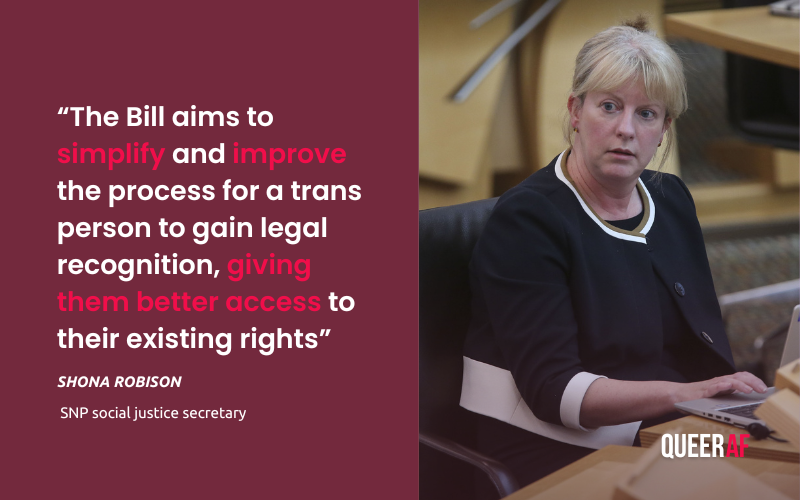TL;DR: Despite media discussion about Scotland's 'Self-ID' law being 'rushed through' - it's one of the most consulted-on pieces of legislation in the country's history Much of the commentary has swirled around what this will mean for single-sex spaces and sports - but that's not what the bill is about.
The Scottish Gender Recognition Bill passed its first parliamentary hurdle this week.
The SNP says it will reduce Scotland's current "intrusive, medicalised and bureaucratic" route to get a gender recognition certificate. That's the legal document that recognises you've changed your gender - ITV
It is opposed by a small but vocal minority of women's groups who argue the law could be abused by men who want to perpetrate attacks on women in single-sex spaces.
The law has safeguards and protections that take these concerns into account. Nonetheless, safety minister Ash Regan chose to resign over the Bill. In total seven SNP MSPs defied the whip - The Telegraph
The law is supported by every party in Holyrood bar the Scottish Conservatives, although two Conservative MSPs did vote for it - The Guardian
What will the law change?
The Bill will remove the requirement for a 'medical diagnosis' of gender dysphoria when seeking a gender recognition certificate - The National
There will still be a three-month period where you'll need to live in the gender you're changing your certificate to before you can get the certificate.
However, this is massively reduced from the two-year process to get a diagnosis which will remain in England, Wales, and Northern Ireland..
Waiting times to begin this can sometimes see trans people wait more than four years for even their first appointment. The Scottish reform builds on the laws of 17 other countries to make this process less arduous.

What the critics say
Because the law removes the 'medical diagnosis' it has been deemed a law that allows 'self-ID'.
This is divisive because newspapers have shared anti-trans dog whistles that suggest that means men could identify as women to justify being in single-sex spaces - without barriers.
However, trans rights activists argue that existing laws (that make assault, rape and violence illegal) alongside the safeguards in this law will keep women safe.
Analysis
It is not unusual for human rights laws to see resignations and small numbers of rebels who vote with their "conscience" and against their government.
Look at any LGBTQIA+ legislation in the UK in the past ten years, and you'll see examples of this on both the left and the right. Still, this was the 'biggest' rebellion (around 10%) the SNP has seen.
We've seen a lot of attention on this Scottish Bill, which is unusual for British papers that largely focus on Westminster politics.
It's because they've successfully turned Scotland's reform into a rage-click driver as they did with similar plans in the UK, which were then shelved.
Much of the commentary has swirled around what this will mean for single-sex spaces and sports.
However, this bill changes only one thing: birth certificates. Everything else is covered by other, unchanged legislation.

We’re not afraid of accountability. It’s why we became the first, and remain the only, regulated LGBTQIA+ outlet in the UK.
This is our contract with our readers: we will always do our best to uphold the highest standards, and we will make things right where we get things wrong.
The IMPRESS standards code protects the public from the worst practices of the media.
As we set out to model change, we believe this standards code will help create a safer environment for LGBTQIA+ stories in the press. We hope to see more publishers follow suit.
Our audience is our most valuable editor, and giving them ways to have their say is crucial. That’s why our ad-free member-funded model lets you set the agenda.
Have your say, and tell us what content is missing in the rest of the media - because we don’t commission based on ‘what creates clicks’. Everything we do is based on what you say should count.












